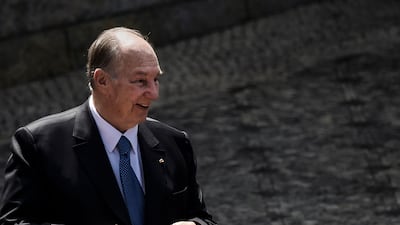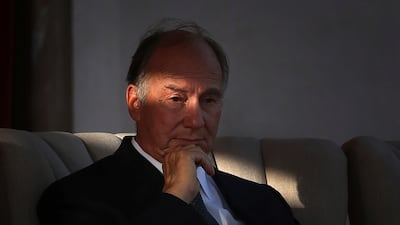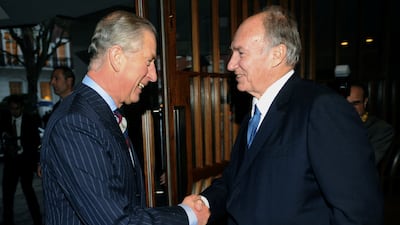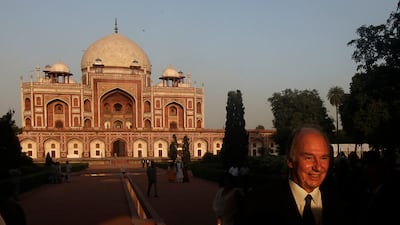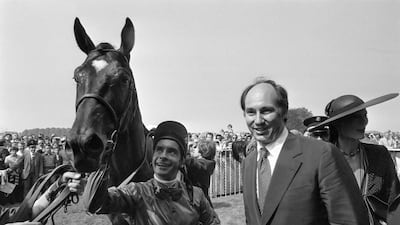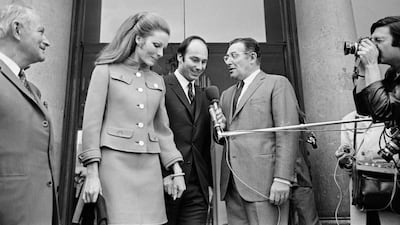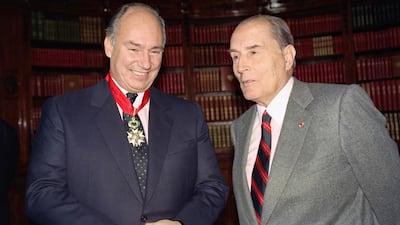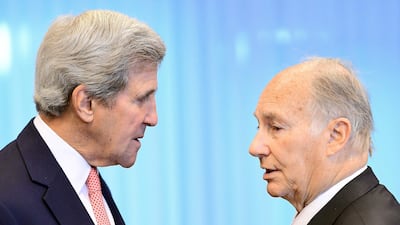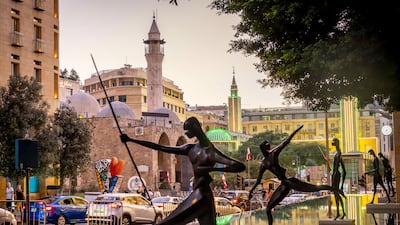The Aga Khan was more than the spiritual leader of the world’s 15 million Ismailis. He was an advocate of Islamic art and architecture who championed both on the world stage.
I learnt of his death while I was visiting the Mughal emperor Humayun’s tomb in New Delhi. One of the great early Mughal monuments, it had recently been restored by the Aga Khan Trust for Culture. Decades ago, I wrote my dissertation about the tomb, and I was one of the first graduate students to benefit from the joint programme he endowed for the study of Islamic architecture at Harvard University and the Massachusetts Institute of Technology, so his death felt somehow very personal.
I remember at the launch of the programme in 1979 how passionate he was about his desire to improve the built environment of the Muslim world. What he said to us left a profound mark on me. He talked about how change could only come through a sustained effort that combined research and scholarship with the recognition of outstanding examples of recent architecture that could stand as models for other projects. He had a plan and a vision that since then has helped communities across the Muslim world recognise the importance of architecture to their lives.
Years later, when I served on the steering committee for his architectural awards, I had a chance to see him in action. Deeply curious, he regularly convened scholars and architects to debate critical issues around sustainability, materials, design, and urban and rural infrastructure.
He was an excellent interlocutor and listened carefully. He understood that to achieve his goals, it was critical to disseminate the results of these debates through the publications and exhibitions that accompanied the awards, which were given every three years. His manner was always courteous, courtly even, but he could be both intimidating – he often knew as much if not more than the people gathered around him – and impatient – he wanted to see measurable results in real time.
I remember thinking at the first steering committee meeting that I attended, that you could feel his presence. It was a kind of aura, or moral authority, centred in his leadership of the Ismaili community. But unlike many leaders today, his vision was capacious and generous, and it went well beyond the community he represented.
The Aga Khan Award for Architecture was part of a larger network of programmes that he supported under the Aga Khan Trust for Culture. He understood that systemic change could be made only through a long-term effort that addressed the full range of cultural needs within and beyond his community. The parks, museums and monuments that he either created or restored in Cairo, Delhi, Herat, Toronto and elsewhere are just a small fraction of what he was able to do to preserve and enhance the built environment. It does not take into account the hospitals and universities that he also invested in.
His vision of the Muslim world was of an open and engaged community that lived by the values of knowledge and generosity despite legacies of colonisation, war and disruption. At a time of rising nationalism and ethnic and political polarisation, his commitment to pluralism and tolerance seems all the more remarkable. That he believed so forcefully in the power of art and architecture to foster respect and across cultures was even more impressive.
It is hard to believe that mosques like the sublime Baitur Rauf in Dhaka or the intimate garden of Samir Kassir Square in Beirut, or the imaginative Kamana Secondary School in Senegal, all of which won an Aga Khan award, could have happened without the decades he spent encouraging architects to find innovative solutions.
The legacy he leaves, from Canada to Pakistan and from India to China, is unparalleled.
IF YOU GO
The flights
FlyDubai flies direct from Dubai to Skopje in five hours from Dh1,314 return including taxes. Hourly buses from Skopje to Ohrid take three hours.
The tours
English-speaking guided tours of Ohrid town and the surrounding area are organised by Cultura 365; these cost €90 (Dh386) for a one-day trip including driver and guide and €100 a day (Dh429) for two people.
The hotels
Villa St Sofija in the old town of Ohrid, twin room from $54 (Dh198) a night.
St Naum Monastery, on the lake 30km south of Ohrid town, has updated its pilgrims' quarters into a modern 3-star hotel, with rooms overlooking the monastery courtyard and lake. Double room from $60 (Dh 220) a night.
DUBAI%20BLING%3A%20EPISODE%201
%3Cp%3E%3Cstrong%3ECreator%3A%20%3C%2Fstrong%3ENetflix%3C%2Fp%3E%0A%3Cp%3E%3Cstrong%3EStars%3A%20%3C%2Fstrong%3EKris%20Fade%2C%20Ebraheem%20Al%20Samadi%2C%20Zeina%20Khoury%3C%2Fp%3E%0A%3Cp%3E%3Cstrong%3ERating%3A%3C%2Fstrong%3E%202%2F5%3C%2Fp%3E%0A
%3Cp%3E%3Cstrong%3EDirector%3A%3C%2Fstrong%3E%20Nag%20Ashwin%3C%2Fp%3E%0A%3Cp%3E%3Cstrong%3EStarring%3A%20%3C%2Fstrong%3EPrabhas%2C%20Saswata%20Chatterjee%2C%20Deepika%20Padukone%2C%20Amitabh%20Bachchan%2C%20Shobhana%3C%2Fp%3E%0A%3Cp%3E%3Cstrong%3ERating%3A%20%3C%2Fstrong%3E%E2%98%85%E2%98%85%E2%98%85%E2%98%85%3C%2Fp%3E%0A
UAE currency: the story behind the money in your pockets
Key facilities
- Olympic-size swimming pool with a split bulkhead for multi-use configurations, including water polo and 50m/25m training lanes
- Premier League-standard football pitch
- 400m Olympic running track
- NBA-spec basketball court with auditorium
- 600-seat auditorium
- Spaces for historical and cultural exploration
- An elevated football field that doubles as a helipad
- Specialist robotics and science laboratories
- AR and VR-enabled learning centres
- Disruption Lab and Research Centre for developing entrepreneurial skills
Biog
Mr Kandhari is legally authorised to conduct marriages in the gurdwara
He has officiated weddings of Sikhs and people of different faiths from Malaysia, Sri Lanka, Russia, the US and Canada
Father of two sons, grandfather of six
Plays golf once a week
Enjoys trying new holiday destinations with his wife and family
Walks for an hour every morning
Completed a Bachelor of Commerce degree in Loyola College, Chennai, India
2019 is a milestone because he completes 50 years in business
A little about CVRL
Founded in 1985 by Sheikh Mohammed bin Rashid, Vice President and Ruler of Dubai, the Central Veterinary Research Laboratory (CVRL) is a government diagnostic centre that provides testing and research facilities to the UAE and neighbouring countries.
One of its main goals is to provide permanent treatment solutions for veterinary related diseases.
The taxidermy centre was established 12 years ago and is headed by Dr Ulrich Wernery.
David Haye record
Total fights: 32
Wins: 28
Wins by KO: 26
Losses: 4
UK-EU trade at a glance
EU fishing vessels guaranteed access to UK waters for 12 years
Co-operation on security initiatives and procurement of defence products
Youth experience scheme to work, study or volunteer in UK and EU countries
Smoother border management with use of e-gates
Cutting red tape on import and export of food
More from Rashmee Roshan Lall
More from Neighbourhood Watch:
MATCH INFO
Everton 2 Southampton 1
Everton: Walcott (15'), Richarlison (31' )
Southampton: Ings (54')
Man of the match: Theo Walcott (Everton)
The biog
Family: He is the youngest of five brothers, of whom two are dentists.
Celebrities he worked on: Fabio Canavaro, Lojain Omran, RedOne, Saber Al Rabai.
Where he works: Liberty Dental Clinic
Global state-owned investor ranking by size
|
1.
|
United States
|
|
2.
|
China
|
|
3.
|
UAE
|
|
4.
|
Japan
|
|
5
|
Norway
|
|
6.
|
Canada
|
|
7.
|
Singapore
|
|
8.
|
Australia
|
|
9.
|
Saudi Arabia
|
|
10.
|
South Korea
|
Specs
Engine: 51.5kW electric motor
Range: 400km
Power: 134bhp
Torque: 175Nm
Price: From Dh98,800
Available: Now
What are the influencer academy modules?
- Mastery of audio-visual content creation.
- Cinematography, shots and movement.
- All aspects of post-production.
- Emerging technologies and VFX with AI and CGI.
- Understanding of marketing objectives and audience engagement.
- Tourism industry knowledge.
- Professional ethics.
More on Quran memorisation:
In-demand jobs and monthly salaries
- Technology expert in robotics and automation: Dh20,000 to Dh40,000
- Energy engineer: Dh25,000 to Dh30,000
- Production engineer: Dh30,000 to Dh40,000
- Data-driven supply chain management professional: Dh30,000 to Dh50,000
- HR leader: Dh40,000 to Dh60,000
- Engineering leader: Dh30,000 to Dh55,000
- Project manager: Dh55,000 to Dh65,000
- Senior reservoir engineer: Dh40,000 to Dh55,000
- Senior drilling engineer: Dh38,000 to Dh46,000
- Senior process engineer: Dh28,000 to Dh38,000
- Senior maintenance engineer: Dh22,000 to Dh34,000
- Field engineer: Dh6,500 to Dh7,500
- Field supervisor: Dh9,000 to Dh12,000
- Field operator: Dh5,000 to Dh7,000
Central%20Bank's%20push%20for%20a%20robust%20financial%20infrastructure
%3Cul%3E%0A%3Cli%3ECBDC%20real-value%20pilot%20held%20with%20three%20partner%20institutions%26nbsp%3B%3C%2Fli%3E%0A%3Cli%3EPreparing%20buy%20now%2C%20pay%20later%20regulations%26nbsp%3B%3C%2Fli%3E%0A%3Cli%3EPreparing%20for%20the%202023%20launch%20of%20the%20domestic%20card%20initiative%26nbsp%3B%3C%2Fli%3E%0A%3Cli%3EPhase%20one%20of%20the%20Financial%20Infrastructure%20Transformation%20(FiT)%20completed%3C%2Fli%3E%0A%3C%2Ful%3E%0A
%3Cp%3EMATA%0D%3Cbr%3EArtist%3A%20M.I.A%0D%3Cbr%3ELabel%3A%20Island%0D%3Cbr%3ERating%3A%203.5%2F5%3C%2Fp%3E%0A
Know before you go
- Jebel Akhdar is a two-hour drive from Muscat airport or a six-hour drive from Dubai. It’s impossible to visit by car unless you have a 4x4. Phone ahead to the hotel to arrange a transfer.
- If you’re driving, make sure your insurance covers Oman.
- By air: Budget airlines Air Arabia, Flydubai and SalamAir offer direct routes to Muscat from the UAE.
- Tourists from the Emirates (UAE nationals not included) must apply for an Omani visa online before arrival at evisa.rop.gov.om. The process typically takes several days.
- Flash floods are probable due to the terrain and a lack of drainage. Always check the weather before venturing into any canyons or other remote areas and identify a plan of escape that includes high ground, shelter and parking where your car won’t be overtaken by sudden downpours.
The rules on fostering in the UAE
A foster couple or family must:
- be Muslim, Emirati and be residing in the UAE
- not be younger than 25 years old
- not have been convicted of offences or crimes involving moral turpitude
- be free of infectious diseases or psychological and mental disorders
- have the ability to support its members and the foster child financially
- undertake to treat and raise the child in a proper manner and take care of his or her health and well-being
- A single, divorced or widowed Muslim Emirati female, residing in the UAE may apply to foster a child if she is at least 30 years old and able to support the child financially
